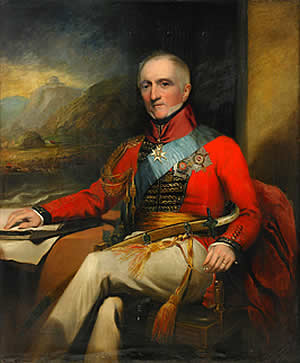 Sir Rufane Shaw Donkin GCH KCB FRS FRGS (1773 – 1 May 1841), was a British army officer of the Napoleonic era and later a Member of Parliament.
Sir Rufane Shaw Donkin GCH KCB FRS FRGS (1773 – 1 May 1841), was a British army officer of the Napoleonic era and later a Member of Parliament.
Family
Rufane Donkin came of a military family and was the eldest child. His father, who reached the rank of a full general, served with many famous British commanders including Wolfe and Gage. The younger Donkin received his first commission at the age of five as an honour post in his father's regiment.
Service
Becoming a captain in 1793, Donkin was on active service in the West Indies in the next year, gaining promotion to major in 1796. At the age of twenty-five he became a lieutenant-colonel and in 1798 led a light battalion with distinction in the Ostend expedition. He served with Cathcart in Denmark in 1807 and two years later was given a brigade of three regiments in the army in Portugal, which he led in victory at the Second Battle of Porto. On the day prior of the Battle of Talavera, Donkin's brigade was positioned ahead of the main British army and was surprised by an advance French force before they could post pickets losing over 400 casualties. He fell back and rallied the men at the main line and led the brigade throughout the battle.
Donkin was then transferred, in the role of quartermaster-general, to the Mediterranean command in which he served from 1810 to 1813 taking part in the Catalonian expeditions. In July 1815, the now Major-General Donkin was posted to India distinguishing himself as a divisional commander in Hasting's operations against the Mahrattas (1817–1818), receiving the KCB as his reward.
The death of his young wife seriously affected him after which he went to the Cape of Good Hope on extended sick leave. From 1820 to 1821 he administered the colony with success, and named the rising seaport of Algoa Bay Port Elizabeth in memory of his late wife.
In 1821 he became lieutenant-general and GCH.
Post Army
The rest of his life was spent in literary and political work. He was one of the original fellows of the Royal Geographical Society, and was a member of the Royal Society and of many other learned bodies. His theories as to the course of the River Niger, published under the title Dissertation on the Course and Probable Termination of the Niger (London, 1829), involved him in a good deal of controversy. From 1832 to 1837 he sat in the House of Commons as Member of Parliament (MP) for Berwick-upon-Tweed, and in 1835 was made Surveyor-General of the Ordnance. He was elected as MP for Sandwich in 1839, and held that seat until he committed suicide at Southampton on 1 May 1841. He was then a general, and colonel of the 11th Regiment of Foot.
Rufane Donkin was a cousin of Charles Collier Michell, surveyor-general of the Cape Colony.
(information derived from http://en.wikipedia.org/wiki/Rufane_Shaw_Donkin)